这次是一个简单的2048游戏,设计比较粗糙,还可以往上面添加音乐、表情之类功能的代码,
一、 先来看看游戏的最终效果:
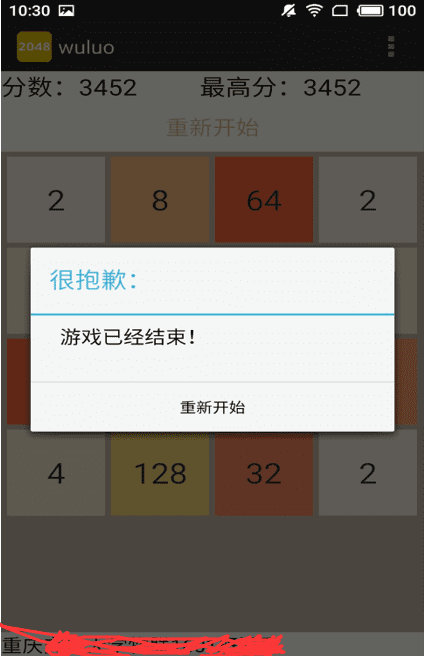
游戏图标的设计:
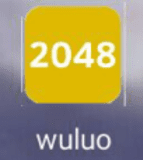
二、代码的主要设计:
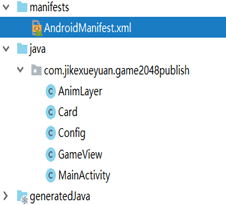
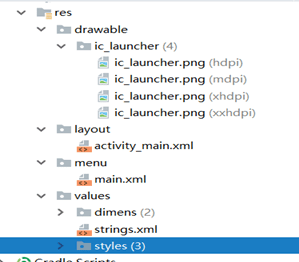
三、关键代码部分
Card部分:
类Card继承了FrameLayout,目的是作为游戏中的卡片。卡片数字和样式的实现:
public void
setNum(int num) {
this.num = num;
if (num<=0) {
label.setText("");
}else{
label.setText(num+"");
}
switch (num) {
case 0:
label.setBackgroundColor(0x00000000);//透明色
break;
case 2:
label.setBackgroundColor(0xffeee4da);
break;
case 4:
label.setBackgroundColor(0xffede0c8);
break;
case 8:
label.setBackgroundColor(0xfff2b179);
break;
case 16:
label.setBackgroundColor(0xfff59563);
break;
……
default:
label.setBackgroundColor(0xff3c3a32);
break;
}
}
num<=0表明是空白方格。当前位置上如果没有card,则使用num<=0的card进行替代。card
0没有label,同时底色为透明。除了card 0之外,card 2之后的卡片都有对应的颜色和数字。
AnimLayer部分:
类AnimLayer继承了FramLayout,用于动画展示。在极客学院安卓2048最主要由两个动画:卡片移动和卡片出现。
卡片出现:
//目标卡片
public void
createScaleTo1(Card target){
//缩放
ScaleAnimation sa = new
ScaleAnimation(0.1f, 1, 0.1f, 1, Animation.RELATIVE_TO_SELF, 0.5f,
Animation.RELATIVE_TO_SELF, 0.5f);
sa.setDuration(100);
target.setAnimation(null);
target.getLabel().startAnimation(sa);
}
卡片移动:
使用ArrayList
cards用于管理临时卡片的创建和回收(避免每次创建临时卡片时创建新的对象);创建一个临时卡片,从卡片from移动到卡片to,当完成动画之后将临时卡片设为不可见,并使用cards回收该卡片。
创建卡片:
private Card getCard(int num){
Card c;
if (cards.size()>0) {
c = cards.remove(0);
}else{
c = new Card(getContext());
addView(c);
}
c.setVisibility(View.VISIBLE);
c.setNum(num);
return c;
}
创建卡片时,如果cards不为空,则从cards队首取出一张临时卡片。(这里认为使用LinkedList更加适合临时卡片管理队列)
回收卡片:
private void recycleCard(Card c){
c.setVisibility(View.INVISIBLE);
c.setAnimation(null);
cards.add(c);
}
回收卡片将当前卡片设为不可见,并加入到cards中。
卡片移动:
public
void createMoveAnim(final Card from,final Card to,int fromX,int toX,int
fromY,int toY){
//临时卡片
final Card c = getCard(from.getNum());
//设置布局
LayoutParams lp = new
LayoutParams(Config.CARD_WIDTH, Config.CARD_WIDTH);
lp.leftMargin = fromX*Config.CARD_WIDTH;
lp.topMargin = fromY*Config.CARD_WIDTH;
c.setLayoutParams(lp);
if (to.getNum()<=0) {
to.getLabel().setVisibility(View.INVISIBLE);
}
//从from卡片位置移动到to卡片
TranslateAnimation ta = new
TranslateAnimation(0, Config.CARD_WIDTH*(toX-fromX), 0,
Config.CARD_WIDTH*(toY-fromY));
ta.setDuration(25);
ta.setAnimationListener(new
Animation.AnimationListener() {
@Override
public void onAnimationStart(Animation
animation) {}
@Override
public void onAnimationRepeat(Animation
animation) {}
//动画结束,将临时卡片回收
@Override
public void onAnimationEnd(Animation
animation) {
to.getLabel().setVisibility(View.VISIBLE);
recycleCard(c);
}
});
c.startAnimation(ta);
}
GameView部分:
GameView继承了GridLayout,包含了界面和游戏逻辑两个部分。这里介绍界面。
界面中比较重要的内容就是手势识别,用于操控格子的移动:
private
void initGameView(){
setColumnCount(Config.LINES);
setBackgroundColor(0xffbbada0);
setOnTouchListener(new
View.OnTouchListener() {
private float startX,startY,offsetX,offsetY;
@Override
public boolean onTouch(View v,
MotionEvent event) {
switch (event.getAction()) {
case MotionEvent.ACTION_DOWN://按下坐标
startX = event.getX();
startY = event.getY();
break;
case MotionEvent.ACTION_UP:
offsetX =
event.getX()-startX;
offsetY =
event.getY()-startY;
if
(Math.abs(offsetX)>Math.abs(offsetY)) {
if (offsetX<-5) {
swipeLeft();
}else if (offsetX>5)
{
swipeRight();
}
}else{
if (offsetY<-5) {
swipeUp();
}else if (offsetY>5)
{
swipeDown();
}
}
break;
}
return true;//listener已经处理了事件
}
});
}
使用了View.OnTouchListener来侦听触摸事件:计算按下和抬起来时offsetX和offsetY,预测手势的移动。
游戏实现的原理部分:
调用函数initGameView()完成游戏初始化:
private void initGameView(){
setColumnCount(Config.LINES);//设置行数量
setBackgroundColor(0xffbbada0);
setOnTouchListener(new View.OnTouchListener() {
}
});
}
设置控件的方格数量,随后设置了控件北京,最后注册了刚才分析过的触摸事件监听器。此时游戏已经准备好了,正式开始。
开始游戏:
函数startGame();正式开始游戏,首先向方格内随机写入两个方块:
public void startGame(){
MainActivity
aty = MainActivity.getMainActivity();
aty.clearScore();
aty.showBestScore(aty.getBestScore());
for (int y =
0; y < Config.LINES; y++) {
for (int x
= 0; x < Config.LINES; x++) {
cardsMap[x][y].setNum(0);
}
}
addRandomNum();
addRandomNum();
}
这个函数addRandomNum()向游戏面板内随机加入两个方块,开始游戏:
private void addRandomNum(){
//private
List<Point> emptyPoints = new ArrayList<Point>();
emptyPoints.clear();
//将所有空格子搜集起来
for (int y =
0; y < Config.LINES; y++) {
for (int x
= 0; x < Config.LINES; x++) {
if
(cardsMap[x][y].getNum()<=0) {
emptyPoints.add(new Point(x, y));
}
}
}
if
(emptyPoints.size()>0) {
//随机位置生成一个card
Point p =
emptyPoints.remove((int)(Math.random()*emptyPoints.size()));
int num =
Math.random()>0.1?2:4;
cardsMap[p.x][p.y].setNum(num);
MainActivity.getMainActivity().getAnimLayer().createScaleTo1(cardsMap[p.x][p.y]);
}
}
函数addRandomNum()向面板中空的格子中随机生成一个卡片。首先搜集面板中所有空的位置,搜集到一个List中,最后生成随机数,随机生成一个数字,并完成生成动画。
2048游戏通过游戏中所有的方格朝某个方向移动,合并相同数字的方块。有四个函数负责移动,分别是上下左右,这里只分析一个方向。
private void swipeLeft(){
boolean merge
= false;//是否合并卡片, 1空卡片和已有卡片合并 2两个数字相同的卡片合并
for (int y =
0; y < Config.LINES; y++) {//对所有列
for (int x
= 0; x < Config.LINES; x++) {
//检查当前点的右侧是否有非空卡片(非空:num>=2)
for
(int x1 = x+1; x1 < Config.LINES; x1++) {
if
(cardsMap[x1][y].getNum()>0) {//如果右边有非空卡片
if (cardsMap[x][y].getNum()<=0) {//当前坐标上没有格子(空卡片和已有卡片合并)
MainActivity.getMainActivity().getAnimLayer().createMoveAnim(cardsMap[x1][y],cardsMap[x][y],
x1, x, y, y);
cardsMap[x][y].setNum(cardsMap[x1][y].getNum());
cardsMap[x1][y].setNum(0);
x--;//和空卡片合并,还需要从当前位置计算(否则:|0|2|2|2|左移之后变为|2|2|2|0|)
merge = true;
}else if (cardsMap[x][y].equals(cardsMap[x1][y])) {
MainActivity.getMainActivity().getAnimLayer().createMoveAnim(cardsMap[x1][y],
cardsMap[x][y],x1, x, y, y);
cardsMap[x][y].setNum(cardsMap[x][y].getNum()*2);
cardsMap[x1][y].setNum(0);
MainActivity.getMainActivity().addScore(cardsMap[x][y].getNum());
merge = true;
}
break;
}
}
}
}
//只要有任意一行发生过卡片移动,则需要产生新的卡片
if (merge) {
addRandomNum();
checkComplete();//判断当前游戏是否失败
}
}
左移,针对面板中所有列,将每行的方块向左移动。在两种情况发生卡片合并:
1 当前位置为空卡片,右侧为非空卡片,合并后当前位置卡片Num为右侧卡片,右侧卡片清零。
2 当前位置为非空卡片,右侧卡片数值和它相等,合并后当前位置卡片数量翻倍,右侧卡片清零。
从游戏角度来讲:1 对应卡片单纯的移动,2 对应两张相同卡片的合并。因此,只要发生卡片实质上的移动,就应该随机再生产一个卡片,调用addRandomNum()。
游戏结束的判断:
每次发生卡片移动,都要检查游戏还能否继续,是否已经结束。函数checkComplete()完成游戏失败(感觉叫做checkFailure()更好)的检查:
private void checkComplete(){
boolean
complete = true;
ALL:
for (int y =
0; y < Config.LINES; y++) {
for (int x
= 0; x < Config.LINES; x++) {
//满足任意两个条件,游戏就可以继续:1 有空的格子,2 有可以合并的卡片
if
(cardsMap[x][y].getNum()==0||//1 有多余空间
(x>0&&cardsMap[x][y].equals(cardsMap[x-1][y]))||//2 和左面相等
(x<Config.LINES-1&&cardsMap[x][y].equals(cardsMap[x+1][y]))|//2
和右面相等
(y>0&&cardsMap[x][y].equals(cardsMap[x][y-1]))||//2 和上面相等
(y<Config.LINES-1&&cardsMap[x][y].equals(cardsMap[x][y+1])))
{//2 和下面相等
complete = false;
break ALL;
}
}
if (complete)
{
new
AlertDialog.Builder(getContext()).setTitle("你好").setMessage("游戏结束").setPositiveButton("重新开始",
new DialogInterface.OnClickListener() {
@Override
public
void onClick(DialogInterface dialog, int which) {
startGame();
}
}).show();
}
}
游戏可以继续的两个条件:有空的格子,或者还有能够合并的卡片。
四、部分界面设计的代码
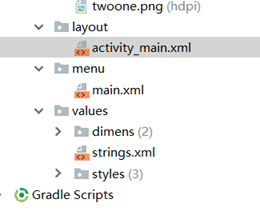
<LinearLayout
android:layout_width="fill_parent"
android:layout_height="wrap_content"
android:orientation="horizontal"
>
<TextView
android:layout_width="wrap_content"
android:layout_height="wrap_content"
android:text="@string/score"
android:textAppearance="?android:attr/textAppearanceLarge" />
<TextView
android:id="@+id/tvScore"
android:layout_width="0dp"
android:layout_height="wrap_content"
android:layout_weight="1"
android:textAppearance="?android:attr/textAppearanceLarge" />
<TextView
android:layout_width="wrap_content"
android:layout_height="wrap_content"
android:text="@string/bestscore"
android:textAppearance="?android:attr/textAppearanceLarge" />
<TextView
android:id="@+id/tvBestScore"
android:layout_width="0dp"
android:layout_height="wrap_content"
android:layout_weight="1"
android:textAppearance="?android:attr/textAppearanceLarge" />
</LinearLayout>
<Button
android:id="@+id/btnNewGame"
android:layout_width="fill_parent"
android:layout_height="wrap_content"
android:background="#0000"
android:text="@string/newgame"
android:textSize="20dp"
android:textColor="#deb887"/>


关于这次2048游戏的一个简单心得体会:
这次是一个简单的2048游戏,关于这个Android的APP程序,这个程序基本实现了2048的要求,在游戏界面,点击重新开始,能刷新界面,出现另外的两个卡片。对于手指的触碰,在卡片的代码中,设计判断滑动的方向,让卡片做出相应的改变。
游戏过程中,只有卡片相邻的位置没有重合的时候才会结束,但点击重新开始也会刷新界面。当整个界面都没有重合的时候,弹出结束界面,可以点击重新开始。
这个程序在设计的时候,遇到点击重新开始时,有些卡片的颜色,不会刷新到初始界面,而是停留到上一个界面。在寻找了相关的资料后,解决了这一个问题。游戏比较粗糙,还可以添加音乐,表情之类的功能。
本文地址:http://www.45fan.com/a/question/99838.html
